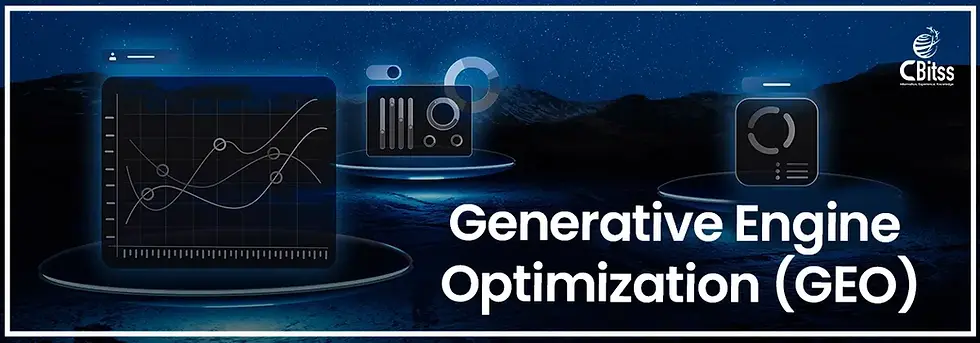Mastering Generative Engine Optimization: Stay Visible in AI-Powered Search
- jobs3074
- Sep 5
- 3 min read
Introduction
Search engines are changing fast. With the rise of AI-powered platforms like Google’s Search Generative Experience (SGE), Bing Chat, and other generative AI tools, the way people find information online is shifting dramatically. Instead of scrolling through a list of blue links, users are increasingly receiving direct, AI-generated answers. This new era demands a fresh approach to digital visibility—known as Generative Engine Optimization (GEO).
In this blog, we’ll explore what GEO means, why it matters, and how you can optimize your content to stay visible in an AI-driven search landscape.

What is Generative Engine Optimization (GEO)?
Generative Engine Optimization is the practice of structuring and refining digital content so it ranks well and is referenced by AI-driven search engines. Unlike traditional SEO, which focuses on keywords and backlinks, GEO emphasizes context, authority, and clarity—making your content not only rank but also be quoted or summarized by AI models.
In short, GEO is about teaching AI to recognize your brand as a credible and trustworthy source.
Why GEO Matters in 2025 and Beyond
AI Search is Mainstream Google SGE and Bing’s AI results are becoming the default experience for millions of users. If your business is not optimized for generative engines, you risk being invisible.
Shift From Clicks to Answers Instead of clicking links, users increasingly rely on AI-generated summaries. GEO ensures your content is referenced in those summaries.
Authority Over Quantity AI doesn’t just pick the top 10 results—it selects the most reliable, comprehensive, and context-rich sources. That means fewer chances for thin or low-quality content to surface.
Key Principles of Generative Engine Optimization
1. Prioritize Contextual Relevance
AI doesn’t just look for keywords—it seeks meaning and intent.
Write in a natural, conversational tone.
Cover topics in-depth, addressing related subtopics.
Use long-tail queries and FAQs to capture user intent.
2. Build Topical Authority
Generative engines trust experts over generalists.
Create pillar content (comprehensive guides).
Link internally to related posts.
Stay consistent in your niche to build subject-matter expertise.
3. Optimize for Conversational Queries
AI search mimics how people talk.
Use question-based headings (e.g., “How does GEO differ from SEO?”).
Add structured Q&A sections to your content.
Provide clear, direct answers that AI can easily pull into summaries.
4. Focus on Trust & Credibility
AI highlights content from authoritative sources.
Showcase expert authorship with credentials.
Cite credible references and link to studies.
Add testimonials, reviews, and case studies where possible.
5. Technical & Structured Data
AI engines thrive on structure.
Use schema markup to signal context (e.g., FAQ schema, How To schema).
Ensure fast-loading, mobile-friendly pages.
Keep your site secure (HTTPS) and easy to crawl.
Aspect | SEO (Traditional) | GEO (AI-Driven) |
Focus | Keywords & rankings | Context, authority & AI interpretability |
Output | Ranked lists of links | AI-generated summaries & citations |
Optimization Target | Search engine algorithms (Google, Bing) | Generative AI models (SGE, Chat GPT, etc.) |
Success Metric | Click-through rate, page traffic | AI mentions, visibility in summaries |
GEO vs SEO: What’s the Difference?
Practical GEO Strategies You Can Apply Today
Create FAQ-Rich Content AI loves structured answers. Build FAQ sections that answer user queries directly.
Use Semantic Keywords Instead of keyword stuffing, use related terms and synonyms that provide context.
Leverage Multimedia Content AI may prioritize diverse content formats (videos, infographics, podcasts).
Update Content Frequently AI rewards fresh, updated information—especially in fast-changing industries like tech and finance.
Engage in Digital PR Get cited in reputable blogs, industry news, and reports. The more backlinks from authoritative sites, the more likely AI engines will recognize you.
Challenges of GEO
Unpredictability: AI models evolve rapidly, and GEO best practices may shift.
Reduced Traffic: If users get answers directly in AI search, fewer may click through.
Content Saturation: As more brands adapt, standing out requires unique insights and not just surface-level content.
The Future of GEO
Generative Engine Optimization is still new, but its importance will only grow. We may see:
Paid GEO placements inside AI summaries.
Interactive AI search results with videos, polls, and product carousels.
Deeper personalization, where AI tailors answers to individual preferences.
Brands that adapt early will gain a significant advantage, while those who ignore GEO risk losing visibility altogether.
Conclusion
In the AI-powered search era, traditional SEO alone is not enough. Generative Engine Optimization (GEO) is the next evolution, ensuring your brand remains visible, trusted, and referenced in AI-driven results. By focusing on context, authority, and credibility, you can future-proof your content strategy and stay ahead of the curve.


Comments